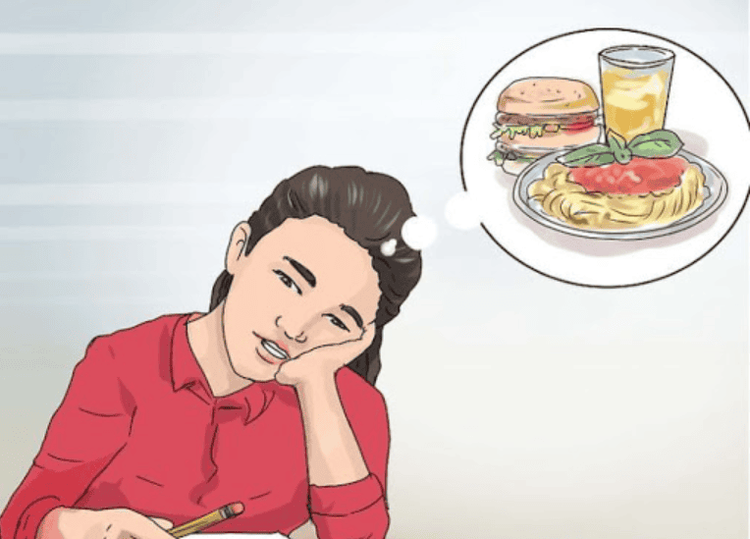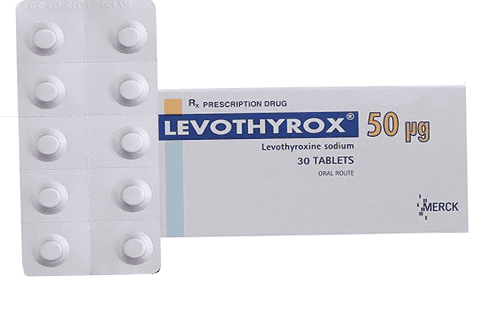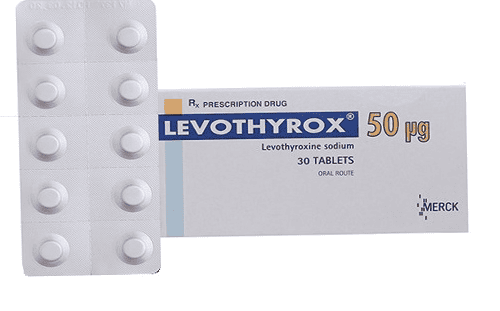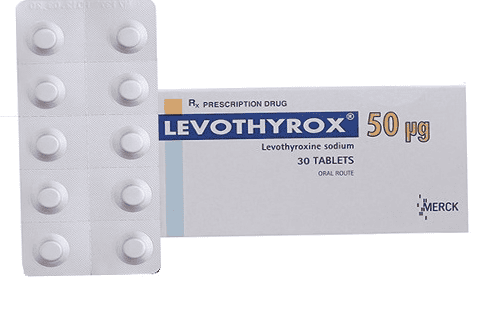This is an automatically translated article.
Posted by Pharmacist Nguyen Van Thang - Faculty of Pharmacy - Vinmec Times City International General Hospital
Levothyroxine is a drug commonly used in the treatment of hypothyroidism. When using an excess or a deficiency of the drug compared to the body's needs, it causes unpleasant symptoms. Therefore, to ensure the effectiveness of treatment and avoid unwanted side effects, users need to know some precautions when using this drug.
1. Information about the drug levothyroxine
Levothyroxine has a reference brand name: Levothyrox or Berlthyrox 50mcg, medicine levothyroxine 100mcg. This is a medication commonly used in the treatment of hypothyroidism, a condition in which the body does not produce enough thyroid hormone. When using excess or insufficient drug compared to the body's needs, it causes unpleasant symptoms such as nervousness, palpitations, hand tremors, sweating, diarrhea (when in excess) or fatigue, cold feet. hands, constipation, sluggishness, memory loss (when lacking). Therefore, timing is very important to ensure the effectiveness of levothyroxine.
2. Some notes on when to use levothyroxine
Food and some medicines can reduce the amount of levothyroxine absorbed from the gut into the bloodstream. Therefore, when using levothyrox, it is necessary to pay attention to:
2.1. Levothyroxine should be taken on an empty stomach, at least 30 minutes before meals
In a study on healthy volunteers, the authors found that taking levothyroxine on an empty stomach was better absorbed than taking it immediately after a meal.
In studies in patients with hypothyroidism, administration of the drug levothyroxine within 20 minutes with breakfast resulted in higher TSH levels (reflecting more thyroid hormone deficiency) than before breakfast. 60 minutes.

2.2. Use away from calcium supplements
Concomitant use of calcium carbonate with levothyroxine may affect the absorption of levothyroxine. The effect may be even more significant in people with pre-existing problems with absorption, for example, who have had a gastrointestinal anastomosis.
The mechanism of reducing levothyroxine absorption is thought to be when, under acidic conditions (in the stomach), levothroxine is adsorbed on the surface of calcium carbonate. Other salts of calcium can also occur. The consequence of this interaction is to reduce the free and total concentrations of thyroid hormone, increasing the concentration of TSH can lead to clinical manifestations of hypothyroidism.
To overcome this, you should take levothyroxine about 1 hour before meals and calcium carbonate about 2 hours after meals. In some cases, your doctor may need to stop taking calcium carbonate if taking the two drugs separately still doesn't achieve the desired effect.
2.3. Use away from preparations containing ferrous sulfate
Concomitant use of levothyroxine and ferrous sulfate may form a poorly soluble iron-levothyroxine complex, which reduces the absorption of levothyroxine leading to decreased thyroid hormone levels, increased TSH, and may require higher doses of levothyroxine.To overcome this situation, you should take the two drugs at least 2 hours apart. Because both drugs are recommended to be taken on an empty stomach, you can take levothyroxine before breakfast, iron sulfate preparations before lunch and/or dinner.
Above are some notes about when to use levothyroxine. In fact, the most important thing is to use the medicine in a consistent way, preferably according to your doctor's prescription and for regular check-ups. At that time, the doctor will adjust the appropriate dose according to your body condition and test results. In case, you want to change the time of taking medicine or want to use other drugs, supplements, you need to talk to your doctor or pharmacist to make sure there are no drug interactions or that your doctor has a plan. monitor more closely.
Please dial HOTLINE for more information or register for an appointment HERE. Download MyVinmec app to make appointments faster and to manage your bookings easily.











